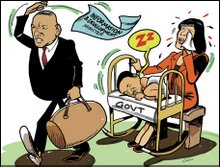Why are track and field athletes so disrespected
The Trinidad Express reported this week that Trinidadian sprinters Aaron Armstrong and Kevon Pierre, both of whom had been earmarked to benefit from the country's elite athlete programme are yet to receive any money from the relevant authorities. Both men were members of Trinidad's 4x100m relay silver medallists in the 2005 World Championships in Helsinki, Finland.
Armstrong, whose father also represented Trinidad at track and field, is now unsure whether he will be able to run next season because he has no money and is uncertain where funding will come from. I presume that Pierre may be having similar difficulties.
A few thousands miles northwest, in Jamaica, another country that produces world class athletes, in the last year alone, three of its best athletes have defected to other nations. At the root of each decision is money or the lack thereof.
Germaine Mason was ranked number two in the world the high jump when he blew out his knee representing Jamaica at the World Indoors. He had to pay for the surgery out of his own pocket despite being on national duties when he got hurt. After surgery and clearly in need of a sports psychologist Germaine could only think of his surgically repaired knee every time he tried to jump after he had healed physically.
He now represents Great Britain and has been placed in a programme that allows him to receive just over 20,000 Pounds each year to assist with training. He was quoted in the British media saying that athletes in Jamaica get nothing from Government.
Brandon Simpson now represents Bahrain after asking the Jamaica Amateur Athletics Association to release him. Word is that the straw that broke his back was when he was told that he had to pay his own way to the World Championships in Helsinki.
This is happening in a country where not so long ago the Government was thinking of spending about three million pound sterling to hire a soccer coach so that Jamaica can return to the World Cup in 2010. That is more than 300 million Jamaican dollars that is being targeted in a country where 70US cents of every dollar earned goes towards servicing and repaying debt. Yet, track and field athletes who have been flying Jamaica's flag high since 1948, go hungry and live in squalor while they train, some not even able to afford the basic amenities but of whom the country expects much each World Championship and Olympic Games.
Just ask Dorian Scott, the national shot putt record holder, who by recent reports cant even find money for food that will allow him to pack on the muscle mass he needs to take him to the highest level of the sport.
The reality is that no matter how much money Jamaica spends on its soccer programme, any team that it puts out will never win the World Cup but this is not to say that we should not try to. A well-organised a soccer programme will help produce players that the island can export to the different leagues around the world and provide opportunities for players who otherwise would not be able to 'make it' in life. So investing heavily in such a programme that will make the Jamaican soccer market more respected is a very healthy long-term investment for the future of the sport in the country. The question is, why can't the same be done for track and field?
The reality is that there are many children in Jamaica who are blessed with athletic talent but have no means by which to exploit that talent for the benefit of themselves and their families. Track and field athletes can make between tens of thousands and millions of dollars each year, why are we not affording more of our talent pool to realise these dreams? The benefits would not only be at an individual level but on a national level as well.




1 comment:
Only in the caribbean!!!! we're so disrespectful and ungrateful to our talents and then get upset when they leave
Post a Comment